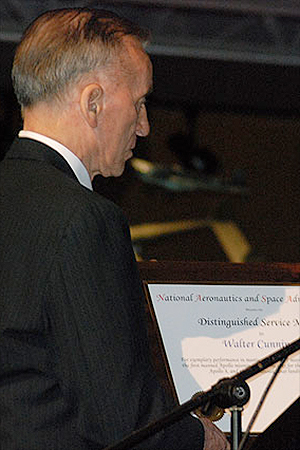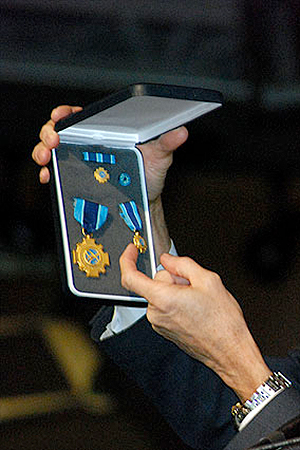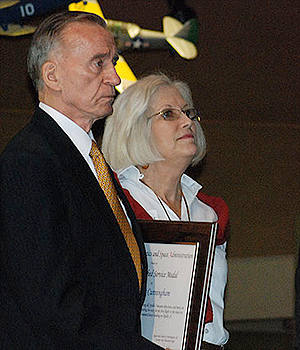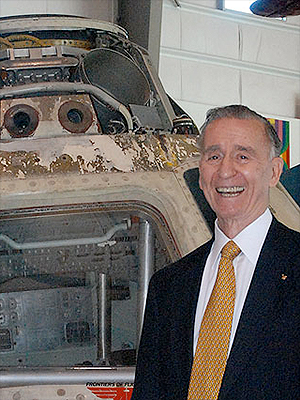October 20, 2008 — Forty years after flying NASA's first crewed Apollo mission, the astronauts of Apollo 7 were honored on Friday (Oct. 17) with the space agency's highest award, the NASA Distinguished Service Medal. The presentation at long-last recognized the Apollo 7 crew's contributions to the United States' first lunar landing program, granting Wally Schirra, Donn Eisele and Walt Cunningham the same award that all of their fellow flown Apollo astronauts received almost four decades earlier.
"For exemplary performance in meeting all the Apollo 7 mission objectives and more on the first manned Apollo mission, paving the way for the first flight to the moon on Apollo 8 and the first manned lunar landing on Apollo 11," NASA Adminstrator Michael Griffin read from the framed certificate that accompanied each of the medals.
"I wrote that citation myself," said Griffin, speaking before an audience of astronauts, flight controllers, the crew's family members and friends during a private celebration held at the Frontiers of Flight Museum in Dallas, Texas. "Looking back... I recognized that the Apollo 7 crew was the only one which did not receive a NASA Distinguished Service Medal."
Apollo 7 launched on October 11, 1968, just 20 months after the Apollo 1 crew — Virgil "Gus" Grissom, Edward White and Roger Chaffee — were killed in a fire that tore through their spacecraft during a ground test on the pad. Their backup crew, Mercury and Gemini veteran Walter "Wally" Schirra and rookie astronauts Donn F. Eisele and Walter Cunningham were assigned to the first mission of the resdesigned spacecraft.
"In its day, the Apollo command module was the most complex machine ever built by man to be operated by man," explained Cunningham on Friday. "We launched on the longest and most ambitious engineering test flight in history, testing the spacecraft systems, verifying the operating procedures, checking out the worldwide tracking network, and that's not to mention testing our crew."
"Apollo 7 was planned as an open-ended mission, lasting up to 11 days. Most of the critical tests of the spacecraft systems took place in the first couple of days because no one really expected the mission to last the full eleven days. There was simply too many opportunities for a system to fail, causing us to come home early, but you know that didn't happen," reflected Cunningham.
Indeed, Apollo 7 was deemed to be a "101% success".
"On the basis of a superbly built and superbly flown Apollo 7 mission, the NASA managers of that era were able to make the decision, the gutsiest call that NASA ever made and the most crucial, to send Apollo 8 to the moon," said Griffin.
With their mission being hailed by NASA, it would seem only natural for the agency to then award the astronauts accordingly, both literally with medals and figuratively, in the form of future flight assignments. And that would've happened, had it not been for Schirra coming down with a cold on the second day of the mission.
Schirra soon passed the illness to Eisele (although to a lesser extent) and while Cunningham would remain well (he would later write that he felt a 'little blah' by the third day), mission control, and through it, the world, came to the belief that the crew as a whole had been stricken. A cold by itself wouldn't have been much of an issue were it not that it had the unfortunate, but understandable effect of leaving Schirra short-tempered, which when coupled with the normal stress of the mission, led him to directly challenge flight controllers orders. At particular issue was the use of a TV camera — the first to be taken to space — and whether or not to don helmets for reentry.
"It might have generated a little more controversy that the ground during flight is used to seeing today," explained Griffin.
As such, instead of presenting the Apollo 7 crew with the Distinguished Service Medal, NASA gave Schirra, Eisele and Cunningham the Exceptional Service Medal.
"NASA hero, second class," described Cunningham in his book "The All-American Boys" first published in 1977. "At the time, Donn and I discussed what effect Wally's bad temper in orbit might have had on the choice. There was no way of being sure, but later events left little doubt that it was indeed a factor. Every other Apollo crew, ten in all, as well as the nine people who flew Skylab, received the Distinguished Service Medal."
As far as flying again, flight director Chris Kraft was clear.
"I told Deke [Slayton] straight out that this crew shouldn't fly again," recalled Kraft in his 2001 memoir of his advice to Slayton, who was then in charge of crew assignments.
Griffin acknowledged his predecessors' decision but said that the crew's achievements merited reconsideration.
"That was all a long time ago, at a very different time, and I think really should not be allowed to obscure the contributions which the Apollo 7 flight crew made to the accomplishments that, well, Bill Anders who is sitting here today, and Neil Armstrong and Buzz Aldrin made just months later. So for that reason, I have three plaques and medals," said Griffin.
Anders, who flew on Apollo 8, accepted the award on the behalf of the Schirra family. Schirra died in May 2007 of a heart attack at age 84.
Eisele passed away in 1987 at 57. Susan Eisele-Black received the medal on behalf of her late husband. "I always considered Wally, Walt and Donn heroes and it is nice after 40 years that NASA does too," she shared.
As the last surviving crew member, Cunningham received praise by those at the museum as well as through several video tributes, including singer Wayne Newton, Houston Mayor Bill White, the crew aboard the International Space Station and former President George H.W. Bush.
President George W. Bush also gave his congratulations via video. "With their extraordinary achievements four decades ago, Walt and his crewmates earned our respect, our gratitude and our recognition as American heroes. Today they remain a testament to our nation's pioneering spirit and the unlimited talents of our people."
Even Kraft recognized Cunningham in a taped message. "I hope that the recognition you received today will restore some of your faith in your fellow travelers. We gave you a hard time once but you certainly survived that and have done extremely well since. You've done well by yourself, you've done well for NASA and I am frankly, very proud to call you a friend."
Several of Cunningham's fellow Apollo astronauts were in attendance for the celebration, including Alan Bean, Buzz Aldrin and Neil Armstrong.
"All of us in the flights that followed were dependent on the Apollo 7 crew doing their job," offered Armstrong, "so thanks Walt and Wally and Donn."
Addressing the audience, Cunningham recalled his time as an astronaut.
"I felt honored to fly the first test flight of a brand new machine that had never been flown before," he said. "During my time at NASA, I would have given anything to go to the moon but that was not to be. Today, I take great satisfaction in the fact that Apollo 7 was a critical mission to play a central role in getting others to the moon." |
|

NASA Administrator Michael Griffin presents Apollo 7 pilot Walter Cunningham the agency's distinguished service medal during a ceremony marking the mission's 40th anniversary. (collectSPACE)

NASA Administrator Michael Griffin displays the pins included with the NASA Distinguished Service Medal. (collectSPACE)

Walt Cunningham, Susan Eisele-Black and Bill Anders accept the Apollo 7 NASA Distinguished Service Medals. (collectSPACE)

Walt Cunningham poses with the Apollo 7 command module on display at the Frontiers of Flight Museum in Dallas. (collectSPACE) |
